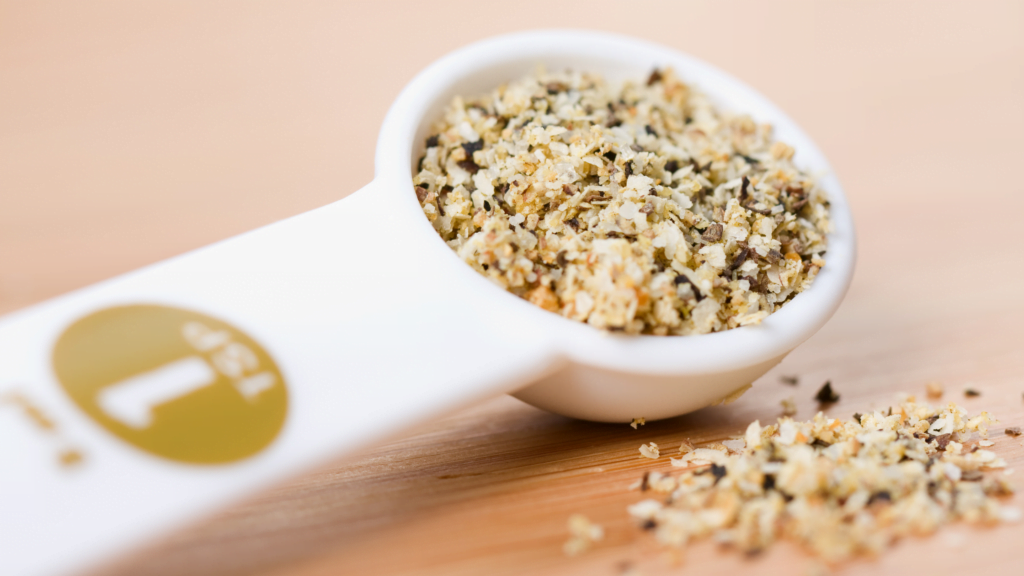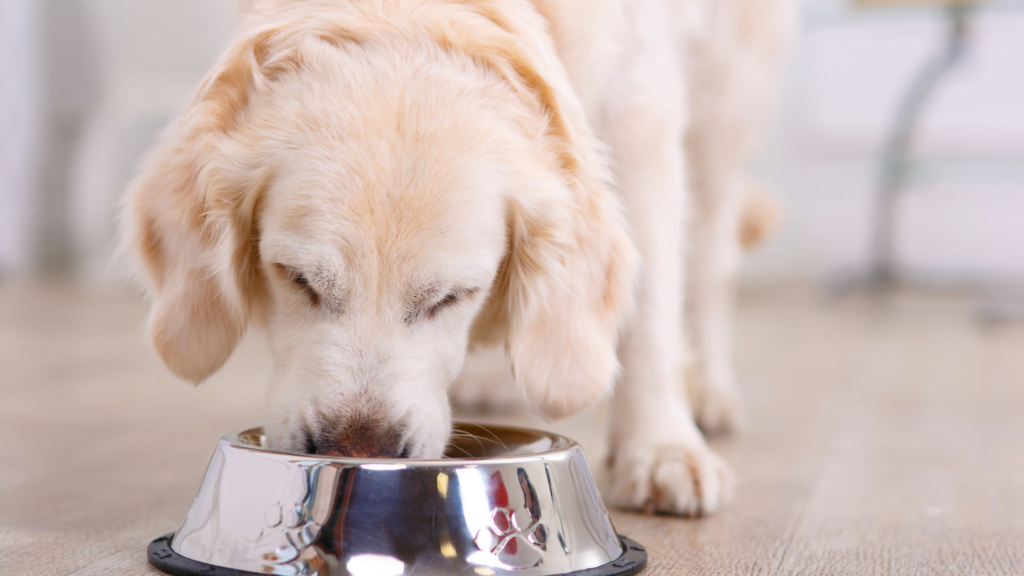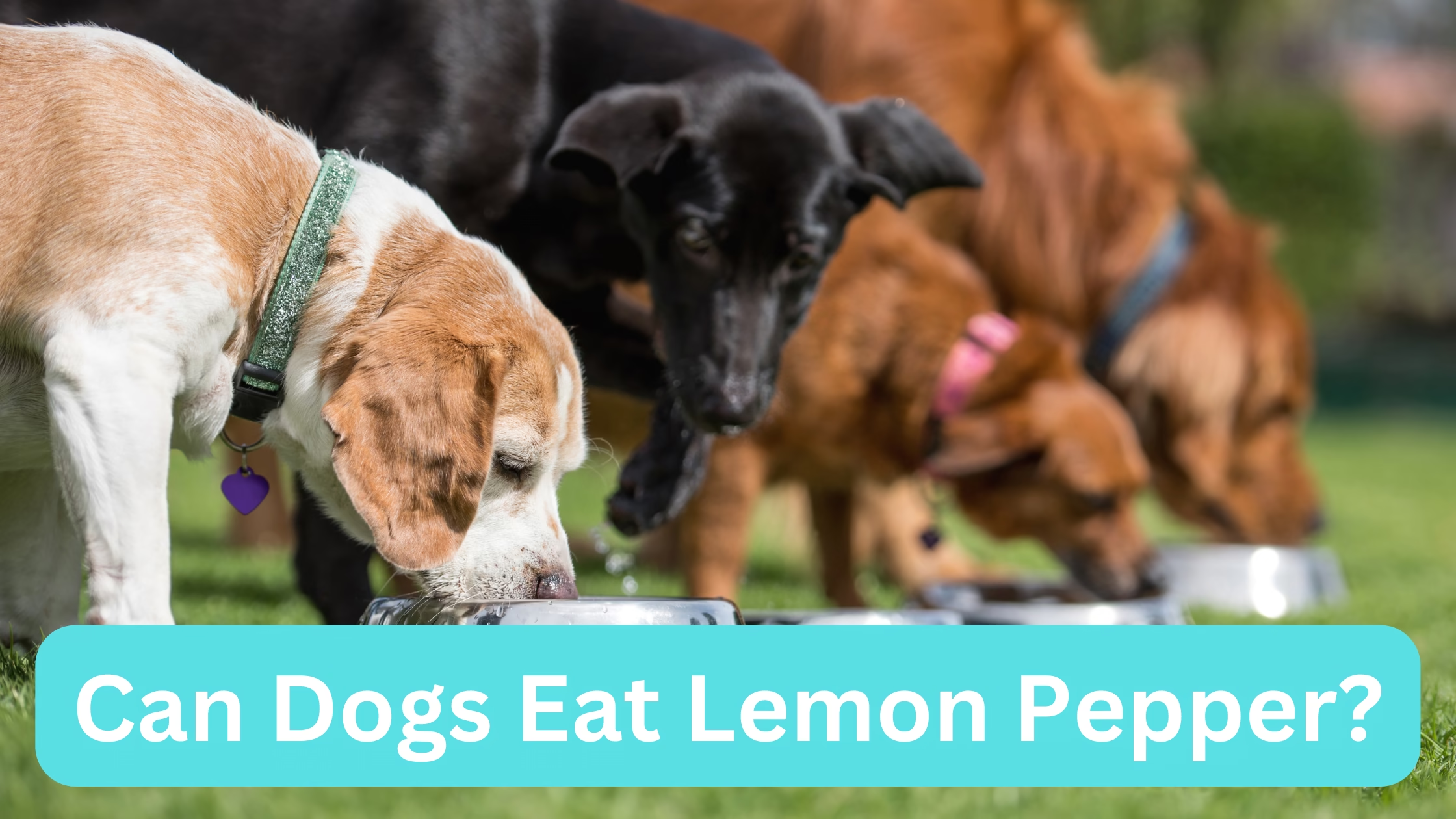As a dog owner, you must be mindful of what you feed your furry friend. While some human foods are safe for dogs, others can be harmful or toxic. If you’re wondering whether Can Dogs Eat Lemon Pepper? Is lemon pepper safe for dogs? Read on to learn more about the potential risks and benefits.
What is lemon pepper?

Lemon pepper is a seasoning blend commonly used in cooking to add flavor to various dishes. It is typically made by combining dried and ground lemon zest with black pepper and sometimes other spices such as garlic or onion powder. Lemon pepper has a tangy and slightly sweet flavor, with mild heat from the black pepper. It is often used to season poultry, seafood, vegetables, and salads. While it is popular in human cuisine, it’s important to understand whether lemon pepper is safe for dogs.
Can Dogs Eat Lemon Pepper? Is lemon pepper safe for dogs?
Lemon pepper seasoning contains ingredients that may be unsafe for dogs, including black pepper and potentially high amounts of sodium. While a small amount of lemon pepper seasoning is unlikely to cause harm to your dog, it is generally recommended to avoid feeding your dog any human food that contains spices or herbs. This is because dogs have different digestive systems and nutritional requirements than humans, and some foods that are safe for us can be harmful or toxic to dogs.
Also, due to the high sodium content, lemon pepper may not be suitable for dogs with certain health conditions, such as kidney disease or hypertension. It’s always best to consult your veterinarian before introducing new foods or seasonings into your dog’s diet to ensure it is safe and appropriate for your furry friend.
Also Read: Are Orbeez Toxic to Dogs? A Comprehensive Guide
Potential risks of feeding lemon pepper to dogs
Feeding lemon pepper seasoning to dogs can potentially cause several risks and health concerns, including:
- Digestive upset: After consuming lemon pepper seasoning, dogs may experience digestive upset, including vomiting or diarrhea. This can be due to the high levels of salt and spices in the herb.
- Sodium toxicity: Lemon pepper seasoning often contains high sodium levels, which can harm dogs in large quantities. Dogs with preexisting health conditions, such as kidney or heart disease, are particularly susceptible to sodium toxicity.
- Allergic reactions: Dogs may be allergic to one or more of the ingredients in lemon pepper seasoning, such as black pepper or garlic. Allergic reactions can cause symptoms such as itching, hives, and swelling.
- Pancreatitis: The high-fat content of some lemon pepper seasoning blends can increase the risk of pancreatitis in dogs. This serious condition can cause abdominal pain, vomiting, and loss of appetite.
- Obesity: Feeding your dog foods high in salt, spices, and fat, like lemon pepper seasoning, can contribute to weight gain and obesity, leading to other health problems such as diabetes, joint issues, and heart disease.
It’s always best to avoid feeding your dog lemon pepper seasoning and other human foods that contain spices and herbs. If you suspect your dog has consumed lemon pepper or any other harmful food, seek veterinary attention immediately.
Health benefits of lemon pepper for dogs
While lemon pepper seasoning may not be safe for dogs to consume in large quantities, some potential health benefits are associated with the individual ingredients in the seasoning. Here are a few examples:
- Lemon zest: Lemon zest contains high levels of vitamin C and antioxidants, which can support your dog’s immune system and help protect against free radical damage.
- Black pepper: Black pepper has antibacterial properties and can help improve digestion and nutrient absorption. In small amounts, it may also help relieve inflammation and pain.
- Garlic: While garlic is not recommended in large amounts, small amounts can provide some health benefits for dogs, such as supporting the immune system and preventing heart disease.
It’s important to note that these health benefits can be obtained from other, safer foods and supplements specifically formulated for dogs. Please speak with your veterinarian about incorporating safe, nutritious foods and supplements into your dog’s diet to promote their health and well-being.
Alternatives to lemon pepper for adding flavor to your dog’s food
If you want to add some flavor to your dog’s food, many safe and healthy options exist. Here are a few alternatives to lemon pepper seasoning:
- Low-sodium broth: Adding a small amount of chicken or beef broth to your dog’s food can provide a tasty flavor boost without the added sodium and spices.
- Fresh herbs: Adding fresh herbs like parsley, basil, or cilantro can provide flavor and beneficial nutrients for your dog. Just be sure to chop them finely and only add a small amount.
- Natural spices: Some natural spices, such as turmeric, ginger, and cinnamon, can be added to your dog’s food in small amounts for flavor and potential health benefits.
- Fresh fruits and vegetables: Adding fresh fruits and vegetables to your dog’s diet can provide a range of vitamins, minerals, and antioxidants while adding natural sweetness and flavor to their meals.
Always introduce new foods and flavors to your dog’s diet slowly and in small amounts, and consult your veterinarian before making any significant changes.
Tips for feeding your dog a healthy and balanced diet

Feeding your dog a healthy and balanced diet is essential for their health and well-being. Here are some tips to help ensure your dog is getting the nutrients they need:
- Choose high-quality dog food: Look for food made with high-quality ingredients, including real meat, vegetables, and fruits. Avoid dog food that contains fillers, artificial preservatives, and colors.
- Consider your dog’s age and health: Dogs have different nutritional needs depending on their age, size, and health conditions. Consider these factors when choosing dog food, and talk to your veterinarian if you have any concerns.
- Avoid feeding your dog human food: While some human foods are safe for dogs in small amounts, it’s generally best to avoid feeding your dog from your plate. Human food can be high in calories, sodium, and unhealthy fats.
- Provide fresh, clean water: Ensure your dog has access to fresh, clean water.
- Measure your dog’s food: Feeding your dog too much can lead to obesity and other health problems. Use a measuring cup to provide the right food for your dog’s size and activity level.
- Incorporate healthy snacks: Treats should comprise at most 10% of your dog’s diet. Choose nutritious snacks like fresh fruits and vegetables or dog-specific treats with high-quality ingredients.
- Consider adding supplements: Certain supplements, such as omega-3 fatty acids or joint support supplements, may benefit your dog’s health. Talk to your veterinarian about which accessories may be appropriate for your dog.
Always consult your veterinarian before making any significant changes to your dog’s diet, and regularly monitor your dog’s weight and overall health.
What to do if your dog accidentally eats lemon pepper
If you suspect your dog has accidentally eaten lemon pepper seasoning, monitoring them closely for any signs of illness or discomfort is important. Here are some steps you can take:
- Remove any remaining lemon pepper seasoning: If your dog has access to the lemon pepper seasoning, remove it from their reach to prevent them from consuming any more.
- Observe your dog’s behavior: Watch for any signs of illness or discomfort, such as vomiting, diarrhea, or lethargy.
- Contact your veterinarian: If you notice any concerning symptoms or are unsure whether the lemon pepper seasoning could harm your dog, contact your veterinarian immediately. They can advise you on the best course of action based on your dog’s circumstances.
- Provide water: Ensure your dog can access fresh, clean water to stay hydrated.
- Be prepared for a vet visit: If your dog has consumed a lot of lemon pepper seasoning or is showing severe symptoms, your veterinarian may recommend bringing them in for an evaluation and potential treatment.
Remember that prevention is always the best approach to keeping your dog safe and healthy. Keep harmful foods and substances out of your dog’s reach, and monitor them closely to prevent accidental ingestion.
Also Read: Are Dogs Allowed in Kroger? Can You Bring Your best Friend to the Store?
Conclusion: Making informed choices about what to feed your dog
As dog owners, it’s our responsibility to make informed choices about what to feed our furry friends. While some foods, like lemon pepper seasoning, may be safe in small amounts, it’s important to be aware of the potential risks and always avoid caution. When feeding your dog, focus on providing a high-quality, balanced diet that meets its nutritional needs. Incorporate healthy snacks and supplements as appropriate, and always consult your veterinarian before making any significant changes to your dog’s diet. By taking these steps, you can help ensure your dog stays healthy and happy for years.







